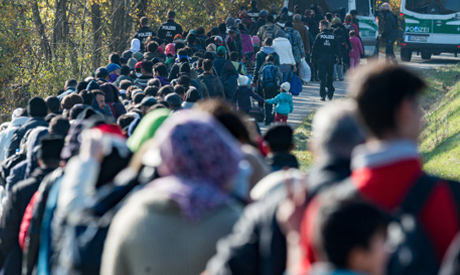
Migrants are led by German Federal Police to an emergency accommodation center after crossing the Austrian-German border near Wegscheid, Germany, Tuesday Oct. 27, 2015 (Photo: AP)
Germany's right-wing populist AfD party made strong gains in local polls in western states on the back of rising support for its anti-migrant rhetoric, ahead of weekend key state elections.
The Alternative for Germany (AfD) became the third biggest party, with support reaching 13.2 percent, in Hesse state, according to initial results released on Monday.
The eurosceptic party, which sparked a storm in January by suggesting police may have to shoot at migrants seeking to enter Germany, was eroding support for Chancellor Angela Merkel's ruling Christian Democratic Union (CDU) and junior coalition partner Social Democratic Party (SPD).
Support for the CDU fell 5.5 percent to hit 28.2 percent, although it still came in as the strongest party, just ahead of the SPD which polled 28 percent, down 3.5 percent from the previous elections.
The result was "very alarming", the vice-chairwoman of the SPD's national parliamentary group, Eva Hoegl, told ARD public television on Monday.
Manfred Pentz, the CDU's general secretary in Hesse, acknowledged that voters were seeking to punish Merkel and her party over her liberal refugee policies.
"The protest is coming at the expense of established parties and benefitting the AfD," he said.
Merkel herself had harsh words for the AfD, which she described in an interview with Bild am Sonntag as a "party that does not bring society together and offers no appropriate solutions to problems, but only stokes prejudices and divisions".
Misgiving is growing in Germany over Merkel's refusal to put a cap on the number of refugees entering the country, after 1.1 million arrived in 2015 alone. The populist party has been quick to capitalist on the mood.
The AfD, which began life as an anti-euro party, now has seats in five regional parliaments, as well as the European Parliament.
It is eyeing its first seats in Baden-Wuerttemberg, Rhineland-Palatinate and Saxony-Anhalt in polls on Sunday.
Short link: